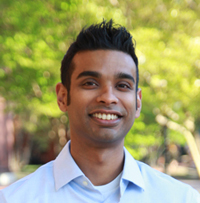Dr. Ovijit Chaudhuri
Seminar Information

The extracellular matrix (ECM) is a complex assembly of structural proteins that provides physical support and biochemical signaling to cells in tissues. Over the last two decades, studies have revealed the important role that ECM elasticity plays in regulating a variety of biological processes in cells, including stem cell differentiation and cancer progression. However, tissues and ECM are often viscoelastic, displaying stress relaxation over time in response to a deformation, and viscoplastic, exhibiting irreversible deformations in response to mechanical stress. In this talk, I will discuss our recent findings on how matrix viscoelasticity regulates various biological processes, including collective invasion by cancer cells and the morphogenesis of pluripotent stem cells.
Dr. Ovijit Chaudhuri is an Associate Professor in the Department of Mechanical Engineering at Stanford University. He earned a B.S. in engineering physics with a minor in mathematics at UC Berkeley. Then, he obtained his Ph.D. in bioengineering at UC Berkeley and UC San Francisco, studying force generation and mechanics of actin cytoskeletal networks with Prof. Daniel Fletcher. From there, he went on to do a postdoctoral fellowship at Harvard University, studying cell mechanotransduction and developing engineered biomaterials for 3D culture with Prof. David Mooney. He joined Stanford in 2013, and his research interests are in cell biophysics and mechanotransduction. His honors include an NSF CAREER award, a National Cancer Institute MERIT award, an American Cancer Society research scholar award, and a DARPA young faculty award,. His group’s research has been supported by the NIH, the NSF, the American Cancer Society, DARPA, and Stanford’s Bio-X Institute. More information about his group’s work can be found at http://chaudhurilab.stanford.edu.
